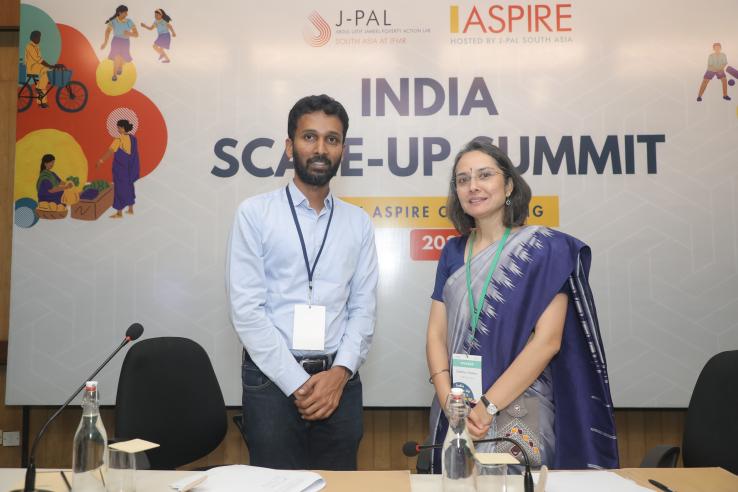J-PAL South Asia and The/Nudge Institute bring poverty reduction plan to states with the Graduation Approach

23 September, 2025, New Delhi - The Abdul Latif Jameel Poverty Action Lab (J-PAL) South Asia at IFMR and The/Nudge Institute have entered into a partnership to accelerate the nation-wide scale-up of the Graduation Approach—a globally successful model that has helped families lift themselves out of extreme poverty.
J-PAL South Asia and The/Nudge Institute will jointly work on government partnerships and capacity building to expand the adoption of the Graduation Approach across India. They will also collaborate on raising resources for evidence generation, knowledge sharing, and program scale up while bringing together governments, NGOs, donors, and multilateral agencies to speed up Graduation Approach’s nationwide adoption.
The/Nudge Institute will support the State Rural Livelihoods Missions of Assam, Tripura, Meghalaya, West Bengal, Rajasthan, and Jharkhand in implementing the Graduation Approach, with Madhya Pradesh set to adopt a similar model. J-PAL South Asia will work closely with The/Nudge Institute in these states to ensure data-informed adaptations of the Graduation Approach.
There is a pressing need for holistic and inclusive livelihood programs in India—and for a variety of stakeholders to work hand-in-hand to effectively deliver them at the last mile to end poverty. While India has made significant strides in poverty alleviation over the last decade, approximately 195 million people continue to live in multidimensional poverty, according to the NITI Aayog’s 2023 Multidimensional Poverty Index Progress report.
J-PAL South Asia and The/Nudge Institute are also part of the consortium supporting India’s Ministry of Rural Development on Samaveshi Aajeevika (Inclusive Livelihoods), the government’s flagship anti-poverty program based on the Graduation Approach. Programs like Samaveshi Aajeevika—that are underpinned by scientific evidence—are critical in combating poverty at scale.
J-PAL South Asia’s partnership with the Ministry of Rural Development on Samaveshi Aajeevika began in 2024. It is supported by the Alliance for Scaling Policy Impact through Research and Evidence (ASPIRE), a joint initiative of J-PAL South Asia and Veddis Foundation that aims to scale impactful, evidence-based programs.
As part of the collaboration with The/Nudge Institute, J-PAL South Asia will also conduct knowledge-sharing workshops, drawing upon its extensive experience of supporting governments in ensuring efficient delivery of the Graduation Approach. The/Nudge Institute will work toward integrating insights from these workshops into research and evaluation of government delivery systems for Samaveshi Aajeevika.
The Graduation Approach is a globally successful model that seeks to support families to break out of extreme poverty by helping them become self-sufficient through a comprehensive support package across a two year period. It includes:
- A productive asset: One-time transfer of a productive asset such as a cow, goat, or supplies for setting up a small business
- Technical Skills Training: Training to manage the productive asset
- Consumption Support: Regular cash or food support for up to a year to meet immediate needs of the household
- Savings: Savings account access and encouragement to save
- Home visits: Frequent home visits by implementing partner staff to provide accountability, coaching, and encouragement
- Health: Health education, health-care access, as well as life skills training
Randomized evaluations by researchers affiliated with J-PAL and Innovations for Poverty Action over 16 years across seven countries found the households receiving the full package of support had a greater standard of living—including higher spending power, regular meals and consumption, and higher income and savings. (More information on the program here.)
The MoU was signed by Shobhini Mukerji, Executive Director, J-PAL South Asia and John Paul, Head, Livelihoods Program, The/Nudge Institute, at the India Scale-up Summit 2025, a day-long convening exploring the role and significance of evidence, partnerships, and systems thinking to drive impact at scale. The event was hosted by ASPIRE in New Delhi today.
Speaking on the partnership, Mukerji said: “J-PAL South Asia's two-decade long journey with the Graduation Approach has consistently shown that with the right support, even the poorest families can take charge of their own lives. Partnering with The/Nudge Institute gives us a unique opportunity to build a scientifically tested intervention into the Government of India’s flagship anti-poverty program so it can reach and benefit millions across India.”
Paul said: "The Graduation Approach has demonstrated strong global evidence of driving long-term economic and social mobility. The/Nudge Institute in partnership with the Ministry of Rural Development and state governments is enabling its adoption across multiple states with the support of multiple non-profits. Our collaboration with J-PAL comes at a pivotal moment, as we prepare to support the Government of India in scaling the Graduation Approach nationwide. I’m excited at the prospect of generating and disseminating evidence to strengthen the scale-up effort and the ecosystem."
ASPIRE’s India Scale-up Summit 2025 featured leaders from governments, philanthropy, academia, and civil society, showcasing real-world journeys from pilot to policy through immersive panel discussions, curated networking, and the ASPIRE Experience Center—a walkthrough of what it truly takes to scale up projects in livelihood, economic inclusion, education, gender equality, and climate.
The India Scale-up Summit 2025 saw voices from the frontlines of social policy innovation in the country come together in the national capital.
Vijayalakshmi Iyer, Associate Director, Policy (Scale-Ups), J-PAL South Asia and Unit Director-ASPIRE, said: “The India Scale-Up Summit 2025 marked the beginning of a long-term movement to place evidence at the heart of India’s development agenda. By bringing together researchers, governments, funders, and civil society, the Summit highlighted the need for sustained collaboration, strategic investments, and government leadership to take proven solutions to scale.”
##